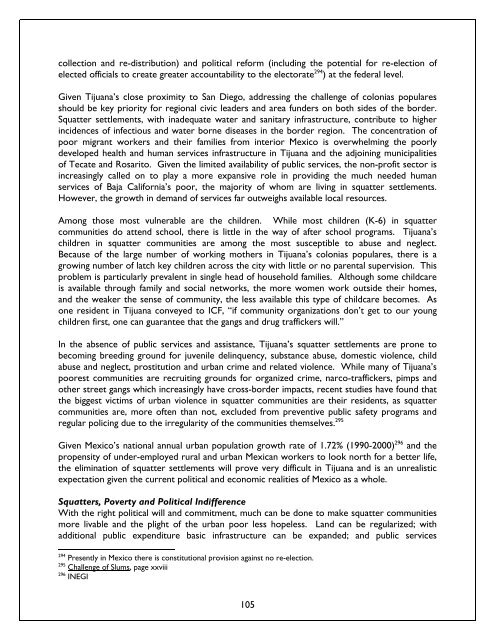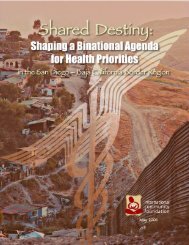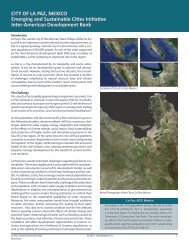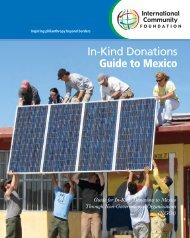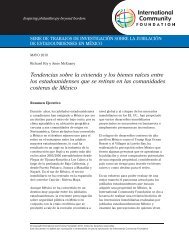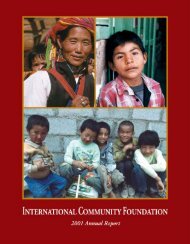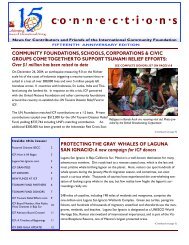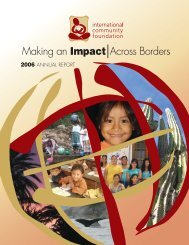Blurred Borders - International Community Foundation
Blurred Borders - International Community Foundation
Blurred Borders - International Community Foundation
Create successful ePaper yourself
Turn your PDF publications into a flip-book with our unique Google optimized e-Paper software.
collection and re-distribution) and political reform (including the potential for re-election of<br />
elected officials to create greater accountability to the electorate 294 ) at the federal level.<br />
Given Tijuana’s close proximity to San Diego, addressing the challenge of colonias populares<br />
should be key priority for regional civic leaders and area funders on both sides of the border.<br />
Squatter settlements, with inadequate water and sanitary infrastructure, contribute to higher<br />
incidences of infectious and water borne diseases in the border region. The concentration of<br />
poor migrant workers and their families from interior Mexico is overwhelming the poorly<br />
developed health and human services infrastructure in Tijuana and the adjoining municipalities<br />
of Tecate and Rosarito. Given the limited availability of public services, the non-profit sector is<br />
increasingly called on to play a more expansive role in providing the much needed human<br />
services of Baja California’s poor, the majority of whom are living in squatter settlements.<br />
However, the growth in demand of services far outweighs available local resources.<br />
Among those most vulnerable are the children. While most children (K-6) in squatter<br />
communities do attend school, there is little in the way of after school programs. Tijuana’s<br />
children in squatter communities are among the most susceptible to abuse and neglect.<br />
Because of the large number of working mothers in Tijuana’s colonias populares, there is a<br />
growing number of latch key children across the city with little or no parental supervision. This<br />
problem is particularly prevalent in single head of household families. Although some childcare<br />
is available through family and social networks, the more women work outside their homes,<br />
and the weaker the sense of community, the less available this type of childcare becomes. As<br />
one resident in Tijuana conveyed to ICF, “if community organizations don’t get to our young<br />
children first, one can guarantee that the gangs and drug traffickers will.”<br />
In the absence of public services and assistance, Tijuana’s squatter settlements are prone to<br />
becoming breeding ground for juvenile delinquency, substance abuse, domestic violence, child<br />
abuse and neglect, prostitution and urban crime and related violence. While many of Tijuana’s<br />
poorest communities are recruiting grounds for organized crime, narco-traffickers, pimps and<br />
other street gangs which increasingly have cross-border impacts, recent studies have found that<br />
the biggest victims of urban violence in squatter communities are their residents, as squatter<br />
communities are, more often than not, excluded from preventive public safety programs and<br />
regular policing due to the irregularity of the communities themselves. 295<br />
Given Mexico’s national annual urban population growth rate of 1.72% (1990-2000) 296 and the<br />
propensity of under-employed rural and urban Mexican workers to look north for a better life,<br />
the elimination of squatter settlements will prove very difficult in Tijuana and is an unrealistic<br />
expectation given the current political and economic realities of Mexico as a whole.<br />
Squatters, Poverty and Political Indifference<br />
With the right political will and commitment, much can be done to make squatter communities<br />
more livable and the plight of the urban poor less hopeless. Land can be regularized; with<br />
additional public expenditure basic infrastructure can be expanded; and public services<br />
294 Presently in Mexico there is constitutional provision against no re-election.<br />
295 Challenge of Slums, page xxviii<br />
296 INEGI<br />
105


